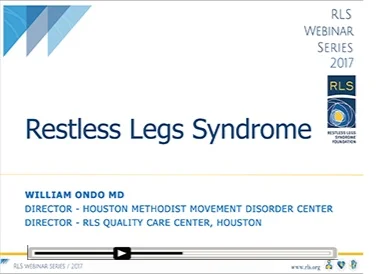Restless Leg Syndrome
Restless legs syndrome (RLS) is a common, chronic sleep-related movement disorder that affects 3-5% of the general population. It is characterized by an irresistible urge to move the legs, often in response to uncomfortable sensations in the legs. People who have RLS describe the sensations as creeping, crawling, tingling, aching or burning. The symptoms are provoked by inactivity and relieved with movement. RLS symptoms are most severe in the evening or at night, so RLS can cause significant sleep disturbance. RLS has been associated with low iron levels, endstage renal disease with dialysis and peripheral neuropathy.
More about RLS
(Text taken from the Mayo Clinic)
Restless legs syndrome (RLS) is a condition that causes an uncontrollable urge to move your legs, usually because of an uncomfortable sensation. It typically happens in the evening or nighttime hours when you're sitting or lying down. Moving eases the unpleasant feeling temporarily.
Restless legs syndrome, now known as restless legs syndrome/Willis-Ekbom disease (RLS/WED), can begin at any age and generally worsens as you age. It can disrupt sleep, which interferes with daily activities.
Simple self-care steps and lifestyle changes may help you. Medications also help many people with restless legs syndrome.
Symptoms
The chief symptom is an urge to move the legs. Common accompanying characteristics of RLS/WED include:
Sensations that begin after rest. The sensation typically begins after you've been lying down or sitting for an extended time, such as in a car, airplane or movie theater.
Relief with movement. The sensation of RLS/WED lessens with movement, such as stretching, jiggling your legs, pacing or walking.
Worsening of symptoms in the evening. Symptoms occur mainly at night.
Nighttime leg twitching. RLS/WED may be associated with another, more common condition called periodic limb movement of sleep, which causes your legs to twitch and kick, possibly throughout the night, while you sleep.
People typically describe RLS/WED symptoms as abnormal, unpleasant sensations in their legs or feet. They usually happen on both sides of the body. Less commonly, the sensations affect the arms.
The sensations, which generally occur within the limb rather than on the skin, are described as:
Crawling
Creeping
Pulling
Throbbing
Aching
Itching
Electric
Sometimes the sensations are difficult to explain. Affected people usually don't describe the condition as a muscle cramp or numbness. They do, however, consistently describe the desire to move their legs.
It's common for symptoms to fluctuate in severity. Sometimes, symptoms disappear for periods of time, then come back.
Supported Projects
Sleep Disorders Clinical Research Program at Massachusetts General Hospital
The Blakeley Foundation provides support to the Sleep Disorders Clinical Research Program, led by John Winkelman, MD, PhD, part of the Outpatient Psychiatry Division of Massachusetts General Hospital. The program is dedicated to clinical and investigative efforts in sleep disorders and the overlap of sleep medicine and psychiatric disorders. It focuses in particular on the following disorders:
Restless legs syndrome (RLS)
Insomnia
Sleep-related eating disorder (SRED)
Dr. John Winkelman, MD PhD
About Dr. John Winkelman, MD PhD
Chief, Sleep Disorders Clinical Research Program Massachusetts General Hospital, Professor of Psychiatry Harvard Medical School
Dr. Winkelman received his PhD in Psychobiology from Harvard University, an MD from Harvard Medical School and then completed both a residency in Psychiatry and a fellowship in Sleep Medicine at Massachusetts General Hospital. He was Medical Director of the Sleep Program at McLean Hospital and subsequently Medical Director of the sleep laboratory at Brigham and Women's Hospital.
He is currently a Professor of Psychiatry at Harvard Medical School and chief of the Sleep Disorders Clinical Research Program in the Department of Psychiatry at Massachusetts General Hospital.
Dr. Winkelman's research has primarily focused in two areas: 1) epidemiology, physiology, cardiovascular consequences and treatment of restless legs syndrome, and 2) neurobiology and treatment of insomnia. He has lectured in and directed post-graduate medical education courses in sleep disorders nationally and internationally. Dr. Winkelman serves on the editorial boards of Sleep Medicine and CNS Drugs. He has published more than 150 articles, reviews and book chapters and is also the editor of the textbook Foundations of Psychiatric Sleep Medicine, Cambridge University Press (2011).
http://www.massgeneral.org/psychiatry/research/researchlab.aspx?id=1755
RLS News:
“Wherefore to some, when beinga bed they betake themselves to sleep, presently in the arms and leggs leapings and contractions of the tendons, and so great a restlessness and tossing of their members ensure, that the diseased are no more able to sleep, than if they were in a place of the greatest torture” - Sir Thomas Willis, 1672
This one-hour webinar covers the basics of RLS for patients newly diagnosed or who have known RLS but would like to learn more about the disorder.
Watch Webinar from RLS.org Now
RLS: Causes, Diagnosis and Treatment. This brochure from RLS.org discusses the symptoms of RLS, possible causes, and different treatment options.
The Prevalence of Common Sleep Disorders in Adults:
Research Studies at Mass General:
Sleep-Related Eating Disorder Study
If you get out of bed to eat at night after you have gone to sleep, you may have sleep-related eating disorder, which can disrupt your sleep and health. Qualified participants can receive study medication, compensation and medical evaluations at no cost. Learn more about this study.
National RLS Opioid Registry
The National RLS Opioid Registry based at Massachusetts General Hospital brings together patients all around the country to assess the long-term safety and effectiveness of opioid medications for RLS. Learn more and register.





